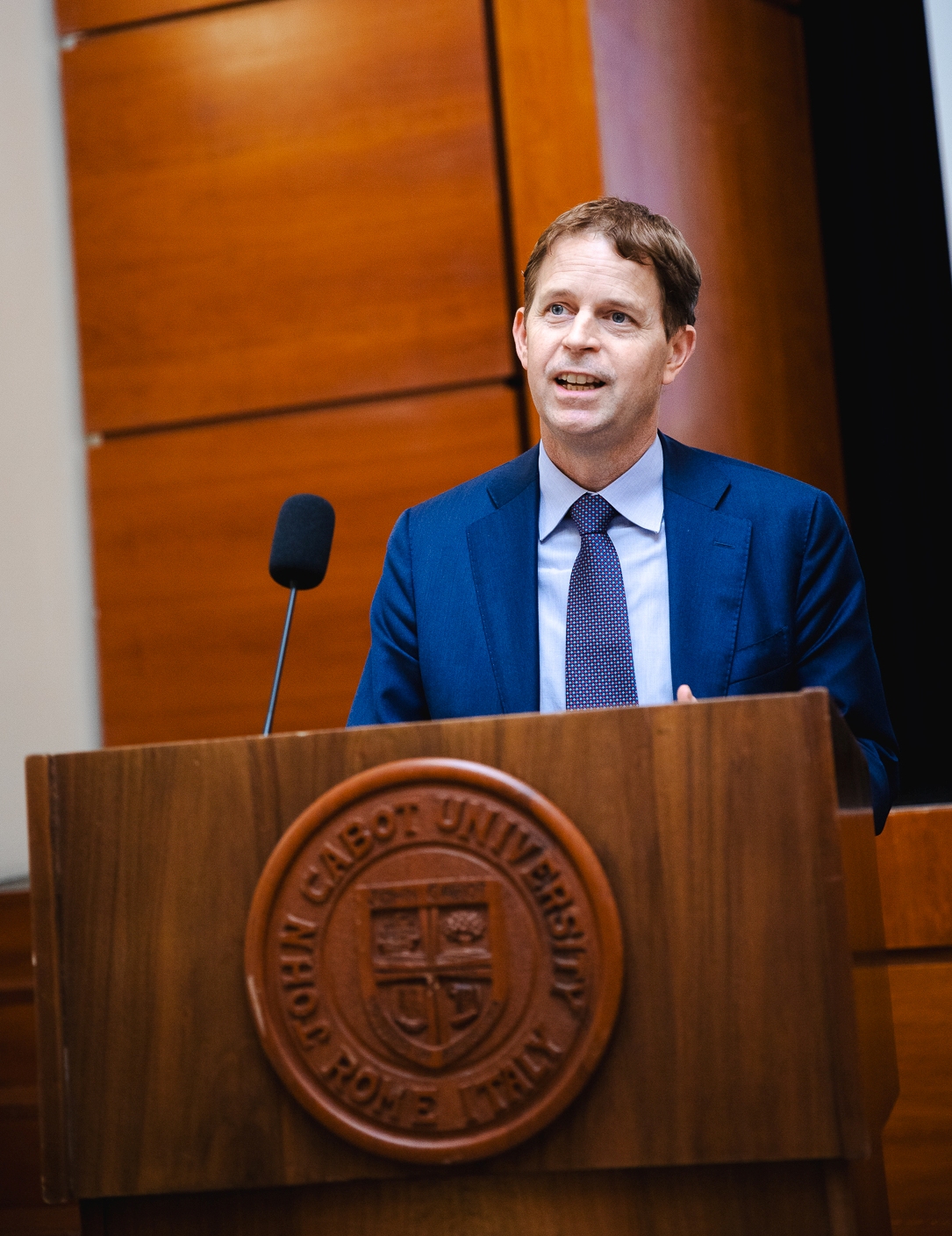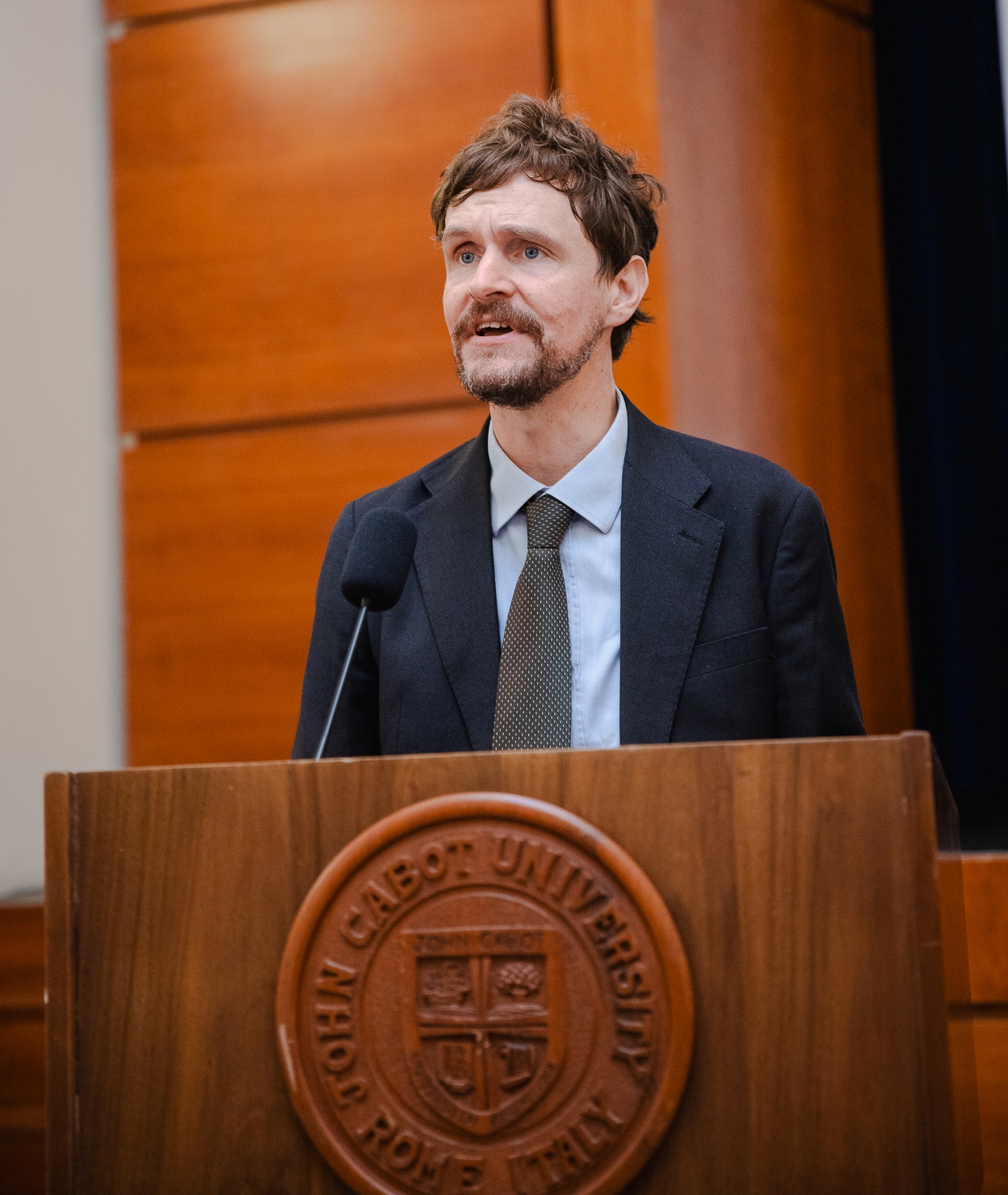Transatlantic Policy Dialogues: JCU Welcomes US Ambassador Jeffrey Prescott and World Food Programme Chief Economist Dr. Arif Husain

On Monday, October 21st, John Cabot University held its third annual Transatlantic Policy Dialogues on the theme “The Political Economy of Food Emergencies.” US Ambassador to the UN Agencies for Food and Agriculture in Rome Jeffrey Prescott offered keynote remarks together with the Head of the Unit for Humanitarian Emergency International Operations at the Italian Ministry of Foreign Affairs and International Cooperation, Fabio Sokolowicz. JCU International Relations Professor Simone Tholens moderated a roundtable panel of experts, which included the Chief Economist for the World Food Programme Dr. Arif Husain, University of Pisa scholar Dr. Dalia Mattioni, and Senior Counsellor at the World Trade Organization’s Agriculture and Commodities Division in Geneva and a member of the Guarini Institute for Public Affairs Dr. Doaa Abdel Motaal.
The John Cabot Transatlantic Policy Dialogues is an annual policy workshop that aims to evaluate the evolving geopolitical challenges and opportunities facing Europe and the United States from a transatlantic perspective, drawing on John Cabot’s position as a bridge connecting the Atlantic and Mediterranean. It includes keynote speakers from both sides of the transatlantic partnership followed by a panel of experts discussing a common strategic challenge. The theme of the JCU 2022 Transatlantic Policy Dialogues was “Italy, the United States and the New Transatlantic Moment,” and the 2023 theme was “Food Security after Ukraine.”
On the Political Economy of Food Emergencies
The event was organized by the Director of JCU’s new MA program in International Affairs, Professor Michael Driessen, who offered welcoming remarks alongside JCU President Franco Pavoncello. Both emphasized the importance of food security and the need for transatlantic efforts to oversee it. They discussed how the political economy of food emergencies has been severely challenged by recent global conflicts. Over the last two years, the wars in Ukraine and Gaza, in addition to ongoing crises in Yemen, Sudan, Syria, Afghanistan, Ethiopia, and the Democratic Republic of the Congo, have interrupted food supply chains all over the world, created vast humanitarian crises and strained the capacity and will of international organizations and actors to help feed those in need.

As Professor Driessen noted, the talk’s goal was to explore these challenges and ask how they have impacted the political economy of food emergencies and the response of the international community.
No Vaccine for Hunger: the Crucial Role of the United States on Food Security
Ambassador Prescott began by stressing the interests and investment of the United States in addressing the challenges of Food Security and Food Emergencies, as well as the ongoing political will that any such response requires, noting that “There is no vaccine for hunger.” He emphasized the United States’ commitment to the crisis of world hunger and its continued position as the world’s largest donor of humanitarian aid, including the UN Food Agencies in Rome. He presented the work of the US Mission to the UN Food Agencies as one of “relentless diplomacy” on food security, seeking to leverage the unique resources of the United States to craft more rapid and sustainable responses to this global emergency.
Fabio Sokolowicz highlighted the work of the Italian Ministry of Foreign Affairs. He argued that the international community has changed its response to humanitarian emergencies over the last few years of global conflict. In doing so, Italy and other countries have more clearly recognized Food Security as a geopolitical issue and as a central element of humanitarian emergencies. Sokolowicz also presented recent Italian efforts in this context, including the Italian Foreign Ministry’s ongoing “Food for Gaza” initiative.
An Increased Emergency, a Man-Made Problem
The panel of experts moderated by Professor Tholens included a wide-ranging discussion on the political economy of food emergencies and recent attempts to rethink the international response to food security. Dr. Doaa Abdel Motaal presented some of the lessons from her work on the WTO Trade Dialogues on Food by elaborating on the tensions between models of food sovereignty and models of food trade and the need to grow more food and to make it more sustainable and nutritious. She advocated that international trade needs to be part of the global solution to world hunger, arguing that “food needs to travel.”
Dr. Arif Hussain highlighted some of the empirical realities of global hunger in the 21st century, noting that global hunger has increased sharply over the last five years to the point where 750 million people –– nearly 10% of the world’s population –– go to bed hungry, and millions more are undernourished. He emphasized the role of conflicts and economic marginalization, and that much, if not most, of global hunger is a man-made problem. He noted how 90% of Palestinians have been living under conditions of a food crisis for over a year because of what is mostly a problem of political access, while the ongoing food crisis in Sudan –– which he said to be worse than the situation during the 2003 Darfur conflict –– represented a problem of both access and assistance.
We Need Overall Better Food Environments
At the end of the evening, Dr. Dalia Mattioni spoke about her research on food sustainability and food security and how both are linked to the overall resilience of food systems. She argued that responding to food security requires building food systems that could absorb shocks. Countries can respond to food crises by constructing food systems that are more sustainable in terms of healthy diets, and environmental and social impacts. She spoke about the importance of “food environments” and the need for investing in the long run, as opposed to short-run solutions to the challenges of global hunger.
Watch the recording of the 2024 Transatlantic Policy Dialogues.





